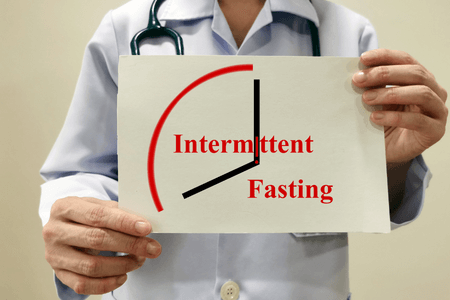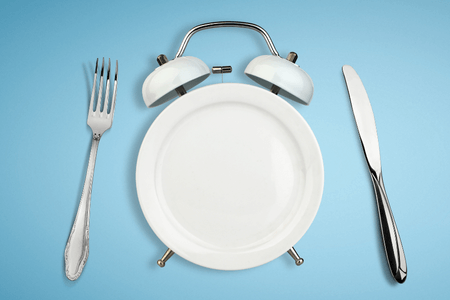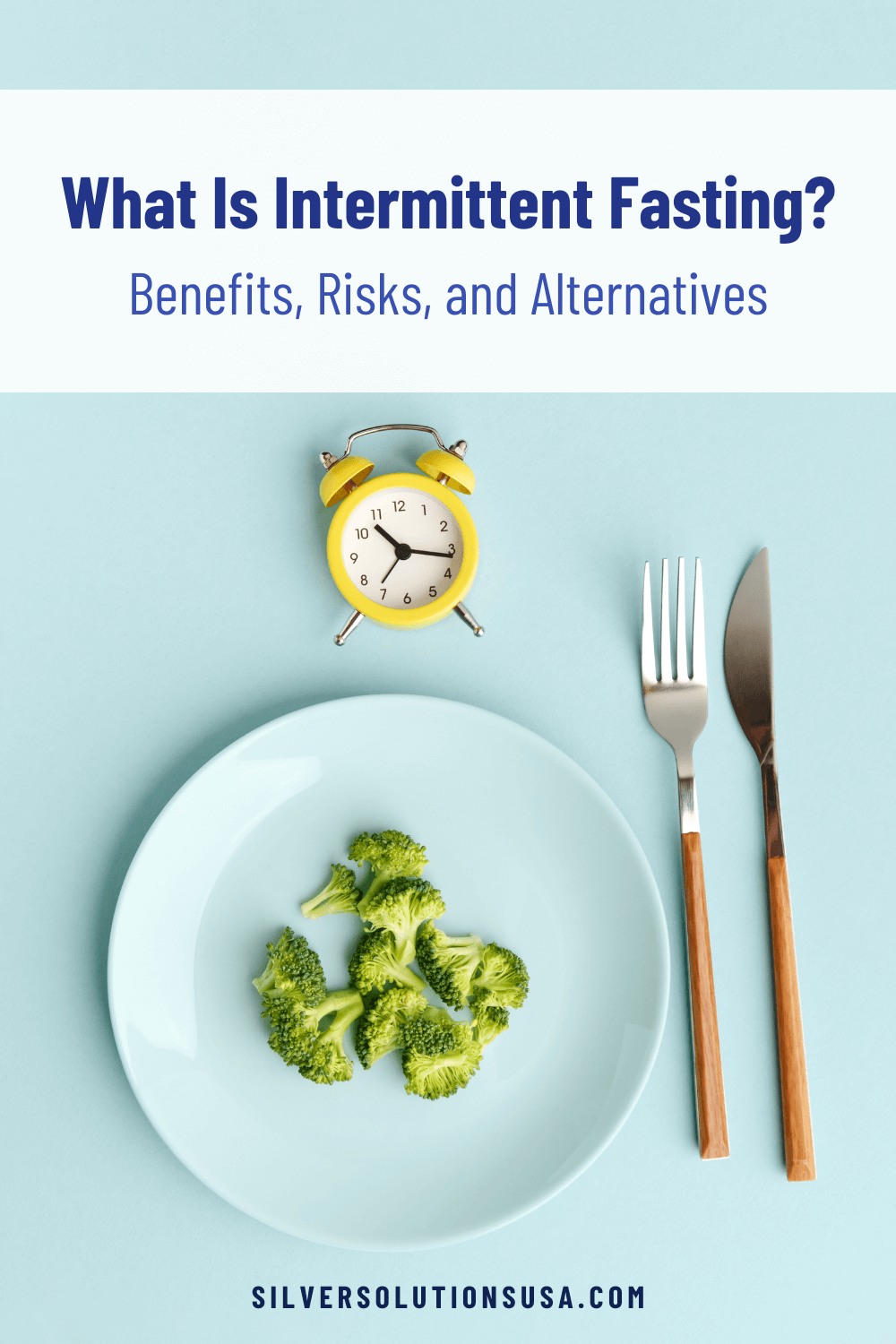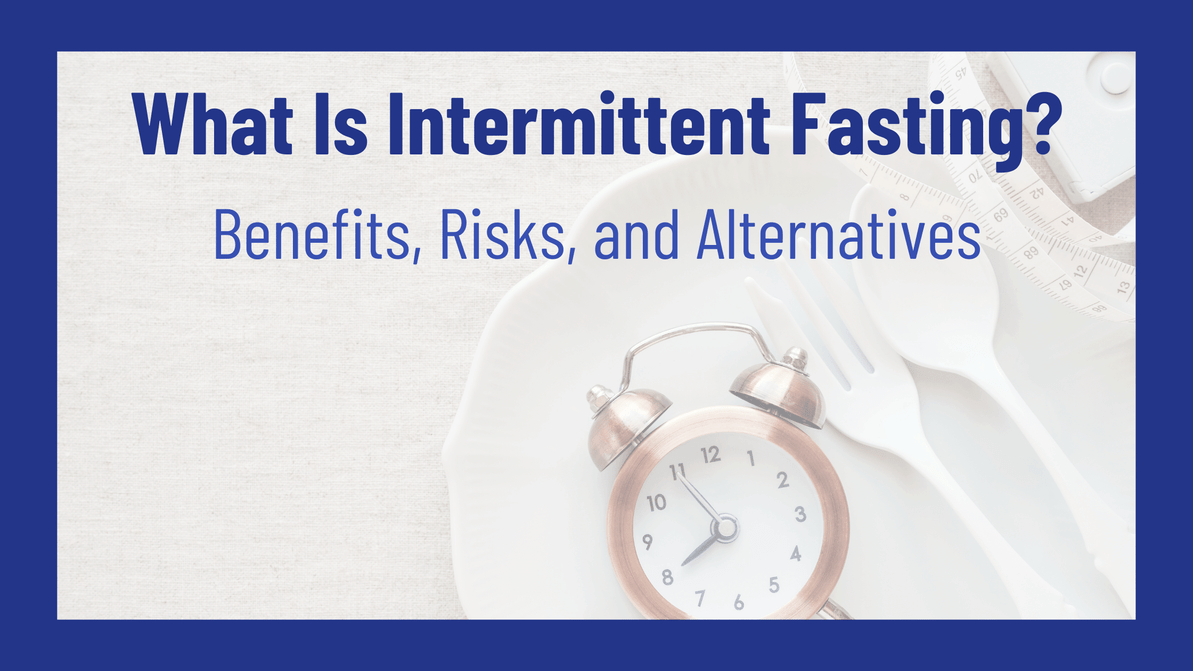What Is Intermittent Fasting? Benefits, Risks, and Alternatives
Intermittent fasting is one of the most popular diet trends at the moment. Its rules are easy to understand, and unlike other diets, you don’t have to give up your favorite foods. Some even say fasting isn’t a diet at all—it’s a lifestyle or an eating pattern.
Intermittent fasting can be helpful with weight loss, blood sugar management, blood pressure, and more. It does have its risks, and some people should avoid it altogether. But for most people, fasting is safe and beneficial.
So what is intermittent fasting? How is it done? What are its benefits and its risks? Here’s everything you need to know about this popular eating pattern.

What is intermittent fasting?
Intermittent fasting is a diet—or, as some prefer to call it, an eating pattern—that cycles between periods of eating and periods of not eating.
It’s not about what foods you eat. It’s about when you eat them.
In a way, we could say we’re all fasting intermittently since we’re taking a break from eating while we sleep. Extending that period by a few hours before and after bedtime gives you a proper intermittent fasting diet.
This principle isn’t new—some need to fast for health reasons, and there’s also religious fasting, which is practiced in various forms by most religions around the world.
Regardless of why you’re fasting and how the idea is the same, give yourself a specific window of time when you eat. Outside of that, you abstain from any food. Liquids, such as water, tea, or even coffee, are permitted and even encouraged depending on the type of fast.

Fasting methods
The world of intermittent fasting is vast and can be downright confusing. We might not be able to cover every single fasting method out there. So let’s take a look at the most common ones.
Time-restricted feeding
This method is very simple. You choose how many hours a day you want to fast. A safe interval, accessible to most, including beginners, is 12 hours.
You eat during a 12-hour period, then fast for the next 12 hours. This method is considered safe for most people since the actual restriction period is only about 4 hours—the rest of the time, you’ll be sleeping.
The most common intermittent fasting method is probably the 16/8 one. You fast for 16 hours daily and eat during the remaining 8.
For most people, this usually means skipping breakfast and eating only lunch and dinner. For instance, you can have your first meal at noon and finish the last meal by 8 pm.
Others may prefer to skip dinner and have breakfast instead. It doesn’t matter when you start eating. What matters is to abstain outside of the 8-hour window.
Other time restrictions can be applied.
Be mindful, however, that more extended periods of fasting can come with risks, so you should make sure your body is up for the challenge.

Eat-Stop-Eat
Also known as “whole-day fasting” or “alternate-day fasting,” this eating pattern requires fasting for 1-2 days during the week. You’ll need to abstain from any food for 24 hours. Water, tea, and black coffee are allowed. Cleanses or detox diets are a form of alternate-day fasting.
This eating pattern comes with risks and should be avoided by those who are pregnant, breastfeeding, and those with a history of eating disorders. Other medical conditions might also advise against it, so check with a doctor before fasting for 24 hours.
The 5:2 diet
This intermittent fasting method feels closest to a diet because it requires counting calories on certain days. More specifically, you eat normally 5 days a week. During the other 2 days, you’ll eat around 500 calories daily.
For some, this feels like a more accessible form of fasting. However, those two days are rather restrictive, so people with a history of eating disorders and those pregnant or breastfeeding should avoid this method. Other medical conditions may also not do well while fasting, so check with a doctor before trying this diet.

Intermittent fasting benefits
Intermittent fasting has many proven benefits. Studies have been conducted on both humans and animals. Human studies still lack variety. For instance, there isn’t enough research on how fasting effects differ based on gender. But we have enough to know fasting can be good for many. Here are some of its main benefits.
Insulin resistance and type 2 diabetes
Intermittent fasting can lower fasting insulin levels by as much as 31%, according to a 2014 study. The same research shows fasting can reduce blood sugar levels by up to 6%. This is highly beneficial for those fighting against insulin resistance and even type 2 diabetes.
There have even been studies that showed patients were able to give up their insulin treatment through fasting. You should only try this under medical supervision, so if you have diabetes, don’t start fasting or stop your treatment without talking to your doctor first.
Weight loss
While experts don’t consider it a diet in the real sense of the word, fasting can help you lose weight. In a study reviewed by Dr. Michael Gregor in this video,
“...front-loading one’s calories earlier in the day with a prolonged nightly fast has been associated with significant weight loss over time, leading the researchers to conclude that eating breakfast and lunch five to six hours apart, and making the overnight fast last 18 to 19 hours may be a useful practical strategy for weight control.”
The idea here is that you set a new normal for yourself, including weekends, as mentioned in the video, as our bodies crave routine.

Heart health and reduced inflammation
Intermittent fasting can lower LDL (“bad”) cholesterol and triglycerides. It can also help lower blood sugar levels. All this can improve your heart health and reduce the risk of strokes and heart attacks.
Studies also show fasting can reduce inflammation markers, which are responsible for various chronic diseases, including arthritis, cancer, and heart disease.
Cognitive performance
Research shows intermittent fasting may help improve concentration and memory. It might also protect against Alzheimer’s disease.
Lower oxidative stress
Oxidative stress can lead to many chronic diseases. It often goes hand in hand with inflammation, which only increases the damage done to your health.
Studies show intermittent fasting could increase the body’s resistance to oxidative stress. This protects not only against premature aging but also against diseases such as dementia and even cancer.

Does intermittent fasting have any risks?
Unfortunately, yes, intermittent fasting has its risks. Most doctors agree that people who had or are currently recovering from an eating disorder should avoid any type of intermittent fasting. That’s because eating and restricting patterns can be triggering, and a relapse can happen.
Pregnant and breastfeeding people should also avoid fasting. During this time, it’s important to give your body all the necessary nutrients. Restricting can cause more harm than good.
There’s also a huge debate going on about women and fasting in general. While there is a lot of research on intermittent fasting, most of it is done on men. Recent research is showing women may not always see the same benefits.
For instance, a study conducted in 2005 showed that fasting improves insulin sensitivity in men. In women, however, it had the opposite effect.
The study looked at the alternate-day fasting method. We can’t say for sure if the same would be true for the 16/8 method, for instance, but it is a clear indicator that women’s bodies may react differently to fasting.
There is also anecdotal evidence that some women can experience issues with their menstrual cycle while fasting.
We know amenorrhea is common in restrictive diets where the body doesn’t get enough nutrients. So if this is a side effect you observe, you should stop fasting immediately as it’s a clear sign this eating pattern isn’t great for your body.
Regardless of your gender, you should also be cautious with fasting if you:
- Are underweight
- Are trying to conceive
- Have low blood pressure
- Have problems with blood sugar regulation
- Take various medications
If you try intermittent fasting and find that you feel light-headed, dizzy, or weak, can’t focus, or have difficulty with physical activity, you may need to adjust your eating schedule. If these symptoms persist, it’s likely your body isn’t doing so well while fasting, so consider a different eating pattern.
Also, if you binge at the end of your fast, this may be a sign that your fasting period is too long. You never want to take your body to a point where it is so starved for nutrients you need to binge to feel full.

Fasting not for you? Try this instead.
If you find intermittent fasting is not for you, but you’d still like the benefits a digestion pause can have for your body, you have a few options.
Start by trying the 12/12 method. You can have breakfast at 8 am, and you’ll need to finish dinner by 8 pm. You can also try to have a very light dinner. While this doesn’t exactly extend your fast, it is an easy step in that direction. You could also try adding more whole plant foods, as they are lower in caloric density.
Another thing you can try is removing all late-night snacks. This will give your digestive system a break between dinner and breakfast without forcing you to count the hours.
And if you find this doesn’t work for you either, that’s ok. There is no one-size-fits-all diet, and fasting is no different.

Key takeaways
Intermittent fasting is an eating pattern where you alternate periods of eating normally with periods of fasting. It can help with:
- Weight loss
- Insulin resistance
- Inflammation
- Type 2 diabetes
- Heart health
- Memory
There are many ways to fast, such as:
- Time-restricted eating
- Alternate day fasting
- The 5:2 diet
One or two-day cleanses can also be seen as a fast.
Intermittent fasting is safe for many people, but it is not for everyone. Avoid it or talk to a doctor if you:
- Are pregnant or breastfeeding
- Are trying to conceive
- Have a history of amenorrhea
- Have a history of eating disorders
- Take any medications
- Have a chronic condition that requires medical supervision
If you like this article, share it on Facebook, and don’t forget to tag us @SilverSolUSA.

Health/Medical Disclaimer
This blog post does not provide health or medical advice. This blog post is for informational and educational purposes only and is not a substitute for professional health or medical advice. Before taking any actions based on such information, we encourage you to consult with the appropriate medical and healthcare professionals. We do not provide any kind of health or medical advice. The use or reliance of any information contained on this blog is solely at your own risk.
Sources
https://www.sciencedirect.com/science/article/abs/pii/S193152441400200X
https://pubmed.ncbi.nlm.nih.gov/25540982/
https://pubmed.ncbi.nlm.nih.gov/34733872/
https://pubmed.ncbi.nlm.nih.gov/32947129/
https://www.ncbi.nlm.nih.gov/pmc/articles/PMC6955834/
https://pubmed.ncbi.nlm.nih.gov/29307281/
https://www.cell.com/cell-metabolism/fulltext/S1550-4131(20)30319-3
https://pubmed.ncbi.nlm.nih.gov/15833943/
https://nutritionfacts.org/video/the-benefits-of-early-time-restricted-eating/
Recent Posts
-
Are sunscreen ingredients harmful?
Sunny days can bring a lot of fun. Going out for a swim, spending time in nature, or relaxing on the …18th Mar 2024 -
The Veggie Debate: Does Cooking Vegetables Destroy Nutrients and the Best Ways to Cook Them
Vegetables are one of the healthiest foods you can choose. Some people downright hate them, while so …4th Mar 2024 -
Best Foods for COVID Recovery and Prevention
A few years ago, a new virus took the world by surprise. COVID-19 may look like the flu on the surfa …19th Feb 2024




